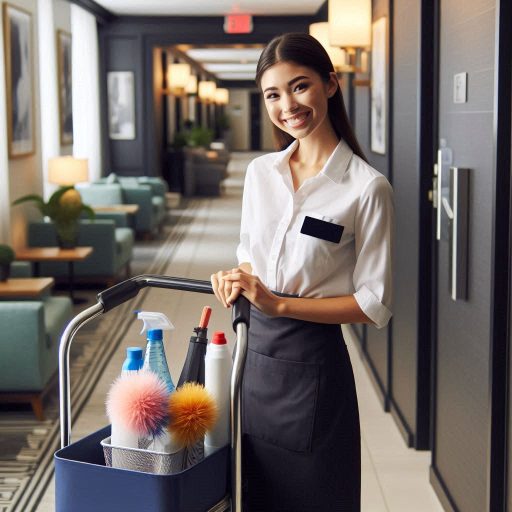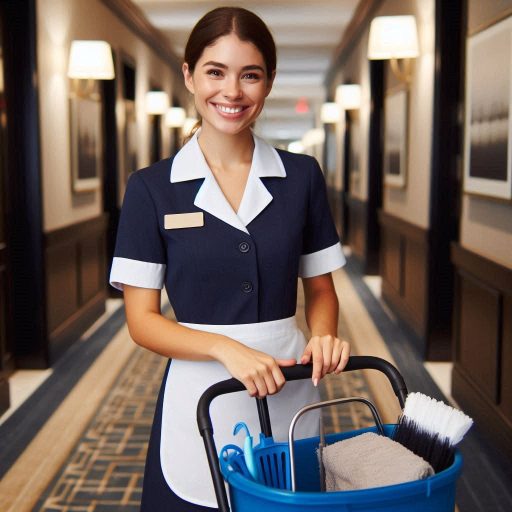Introduction
Housekeeping jobs offer a range of benefits that can significantly enhance your career experience.
Understanding these benefits is crucial for prospective housekeepers.
Many people overlook the advantages of working in this field.
Housekeeping roles provide job stability, competitive wages, and health benefits.
Additionally, they can lead to career advancement opportunities and flexible schedules.
Being aware of these perks helps candidates make informed decisions.
Housekeeping positions often come with valuable training programs, equipping staff with essential skills.
These skills contribute to personal growth and job satisfaction.
Furthermore, housekeepers often receive employee discounts that can reduce everyday expenses.
This aspect adds a layer of financial benefit to the job.
Ultimately, recognizing the benefits associated with housekeeping roles allows candidates to evaluate potential job opportunities.
It prepares them for a fulfilling career.
In this blog, we will explore the various benefits of working as a housekeeper.
We aim to provide valuable insights for anyone considering this rewarding career path.
Understanding what to expect will empower candidates to make informed choices and fully appreciate their future roles in the hospitality industry.
Job Stability
How housekeeping jobs are often in demand and offer stable employment
Housekeeping jobs provide significant job stability in the hospitality industry.
Hotels, resorts, and other accommodations consistently require cleaning and maintenance.
This high demand for housekeeping services ensures that positions remain available.
Many establishments prioritize hiring full-time staff for their housekeeping departments.
This focus on full-time employment often leads to regular hours.
Housekeepers typically work set shifts, providing a consistent work schedule.
This predictability allows employees to plan their personal lives effectively.
Many workers appreciate this routine, as it promotes work-life balance.
Moreover, the hospitality industry has proven resilient during economic fluctuations.
While some sectors experience layoffs, hotels often maintain their staffing levels.
Guests consistently seek accommodations, even during tough economic times.
This need for reliable service means housekeepers can find steady employment opportunities.
The potential for long-term employment with regular hours
Long-term employment is common in the housekeeping field.
Many employees enjoy working for the same establishment for years.
This stability allows housekeepers to develop strong relationships with colleagues and management.
Over time, they can become familiar with the property and its unique needs.
Additionally, many hotels offer advancement opportunities within their housekeeping departments.
Housekeepers can move into supervisory roles or other management positions.
This potential for career growth adds to the appeal of working in housekeeping.
Employees can build their skills and increase their responsibilities over time.
Job stability also provides financial security for housekeeping staff.
Regular employment means consistent income, allowing workers to plan their finances.
Many hotels offer competitive wages, benefits, and incentives.
These perks further enhance job satisfaction and encourage employees to stay long-term.
Housekeeping jobs offer excellent job stability.
The constant demand for cleaning services creates reliable employment opportunities.
Regular hours allow staff to maintain a healthy work-life balance.
Long-term employment fosters strong relationships and career growth.
Overall, working in housekeeping can be a secure and rewarding choice for many individuals.
Read: How Much Do Pet Groomers Earn in the USA?
Competitive Wages
The average wage for housekeepers and compare it to other entry-level positions
Housekeeping jobs offer competitive wages in the hospitality industry.
The average wage for housekeepers varies by location and establishment.
According to recent data, housekeepers earn approximately $13 to $20 per hour.
This wage range positions housekeeping as a solid choice among entry-level positions.
When compared to other entry-level roles, housekeeping can be quite appealing.
For instance, retail and fast-food jobs often pay lower wages.
Many retail positions start at minimum wage, typically around $7.25 to $11 per hour.
In contrast, housekeepers enjoy better pay and consistent hours.
Additionally, housekeepers often benefit from regular raises and wage increases.
Many hotels and establishments provide annual performance reviews.
These reviews can lead to wage adjustments based on individual performance and company profitability.
Housekeeping staff who demonstrate dedication and hard work may see their salaries increase over time.
Opportunities for earning bonuses or tips in the industry
Housekeepers can also earn additional income through bonuses and tips.
In many hotels, guests appreciate the work of housekeepers.
Satisfied guests often leave tips for their housekeeping staff.
These tips can significantly enhance a housekeeper’s overall earnings.
In some luxury hotels and resorts, housekeeping staff may receive more substantial tips.
Guests at high-end establishments tend to express gratitude through generous tips.
This practice can lead to a significant boost in overall income.
Some housekeepers report receiving $5 to $20 per day in tips, depending on the establishment and guest satisfaction.
Moreover, many hotels implement bonus programs for their staff.
These programs often reward employees for exceptional service or meeting specific performance metrics.
Bonuses can vary based on the establishment, but they contribute to overall compensation.
Housekeepers may receive bonuses during peak seasons or special events.
Housekeeping offers competitive wages compared to other entry-level jobs.
The average pay for housekeepers is generally higher than roles in retail or fast food.
Opportunities for raises further enhance job attractiveness.
Additionally, housekeepers can earn tips and bonuses, increasing their total income.
This combination of competitive wages and extra earning potential makes housekeeping a viable and rewarding career choice.
Read: Top Pet Grooming Conferences and Expos in the USA
Health Benefits
Potential for health insurance coverage through housekeeping jobs
Housekeeping jobs often provide valuable health benefits, making them an attractive option for workers.
Many housekeeping positions offer health insurance coverage.
Large hotels, resorts, and cleaning companies usually provide health insurance to their full-time housekeeping staff.
This coverage typically includes medical, dental, and vision care, ensuring that employees can access essential healthcare services.
For housekeepers, having health insurance is crucial.
The physical nature of the job can lead to occasional injuries or health concerns.
Having access to medical care allows housekeepers to stay healthy and continue working without significant financial burdens.
Many employers also offer family coverage, ensuring that dependents can benefit from health insurance.
Health insurance coverage can vary between employers.
Some companies cover a substantial portion of the insurance premium, while others require employees to pay part of the cost.
Regardless, the opportunity to receive employer-sponsored health insurance is a key benefit in the housekeeping field.
Other health-related benefits, such as paid sick leave or access to wellness programs
In addition to health insurance, housekeeping jobs may offer other health-related benefits like paid sick leave.
Many companies provide paid sick days for their staff, allowing housekeepers to take time off when ill without losing income.
Paid sick leave promotes a healthier work environment by encouraging workers to stay home when they are unwell, preventing the spread of illness.
Wellness programs are another potential perk.
Some housekeeping employers offer wellness programs to support employees’ physical and mental well-being.
These programs may include gym memberships, fitness classes, or access to mental health resources.
Participating in wellness programs can help housekeepers maintain their health and improve their overall quality of life.
Employers understand that a healthy workforce is more productive and efficient.
Offering benefits like paid sick leave and wellness programs shows that companies value their employees’ well-being.
It also helps reduce turnover, as workers feel appreciated and supported by their employers.
Housekeepers working in larger hotels or unionized environments may enjoy additional health-related benefits.
Unions often negotiate better benefit packages, including comprehensive health insurance, more paid sick days, and enhanced wellness initiatives.
This can significantly improve the working conditions for housekeepers and offer them peace of mind regarding their health.
Housekeeping jobs provide essential health benefits that contribute to workers’ well-being.
Health insurance coverage, paid sick leave, and wellness programs enhance the overall appeal of housekeeping careers.
These benefits ensure housekeepers can stay healthy, receive proper medical care, and maintain a balanced lifestyle while working in a physically demanding job.
Read: Educational Requirements for Childcare Workers Explained
Career Advancement
How housekeeping jobs can serve as a stepping stone for future career opportunities
Housekeeping jobs can serve as an excellent foundation for career advancement.
Many employees start in housekeeping to gain experience and skills.
This entry-level position often leads to various opportunities in the hospitality industry.
Workers can develop essential skills such as time management, organization, and attention to detail.
These skills are valuable in many roles within hotels, resorts, and other hospitality settings.
Many housekeepers find that their experience opens doors to other positions.
They may transition into roles like front desk staff, event coordinators, or concierge services.
The hospitality industry values the insights gained from working in housekeeping.
Employees with this background often understand guest needs better than those without similar experience.
Furthermore, many hotels promote from within, creating pathways for career growth.
Housekeepers who demonstrate strong work ethic and commitment often receive recognition.
This can lead to opportunities for promotions or lateral moves into other departments.
Such transitions often provide a chance to explore different areas of the hospitality field.
The potential for promotion to supervisory or management positions in the industry
Housekeeping roles also offer the potential for promotions to supervisory or management positions.
Dedicated housekeepers may become team leads, supervisors, or even housekeeping managers.
These roles involve overseeing staff, managing schedules, and ensuring quality standards are met.
Supervisory positions require strong communication and leadership skills, which housekeepers often develop in their initial roles.
Many hotels offer training programs to prepare housekeepers for management positions.
These programs focus on leadership skills, budgeting, and operational management.
Participating in such programs can enhance a housekeeper’s career prospects.
Employees who take the initiative to learn and grow often stand out to employers.
Advancing to a management position not only increases responsibility but also enhances earning potential.
Housekeeping managers typically receive higher salaries than entry-level housekeepers.
This financial incentive can motivate housekeepers to pursue career advancement actively.
Networking also plays a crucial role in career advancement.
Housekeepers who build relationships with colleagues and supervisors can learn about new opportunities.
Attending industry events or training sessions can further expand their professional network.
Establishing connections within the hospitality industry can lead to job offers or recommendations for promotions.
Housekeeping jobs provide a solid foundation for career advancement.
They offer valuable skills and experience, paving the way for future opportunities.
With dedication and hard work, housekeepers can transition into supervisory or management roles.
These advancements enhance job satisfaction and improve earning potential, making housekeeping a rewarding career choice.
Read: Top Certifications for Advancing in Childcare Careers

Flexible Schedules
The option for flexible work hours in many housekeeping positions
Many housekeeping positions offer flexible work hours.
This flexibility can be a significant advantage for employees.
Hotels, resorts, and other hospitality businesses often require staffing at various times.
As a result, housekeepers can choose shifts that fit their lifestyles.
Some may prefer early morning shifts, while others may opt for evenings or weekends.
This flexibility caters to individuals with different needs and obligations.
Students can work part-time while attending classes.
Parents can schedule their shifts around school hours and family commitments.
Moreover, those who pursue other interests can balance work and personal projects more easily.
Employers often appreciate this flexibility, too.
Offering varied schedules helps them maintain staffing levels.
It allows them to meet guest needs while accommodating employees’ preferences.
In turn, this can lead to higher job satisfaction and lower turnover rates.
The benefits of work-life balance that come with a more flexible schedule
A flexible schedule greatly enhances work-life balance.
Employees can manage their personal and professional lives more effectively.
This balance contributes to overall well-being and happiness.
When individuals can accommodate personal commitments, they feel more fulfilled.
Flexibility also reduces stress and burnout.
Workers who can adjust their schedules are less likely to feel overwhelmed.
They can prioritize family time, hobbies, or self-care activities.
This holistic approach fosters a healthier lifestyle and improves mental health.
Moreover, a positive work-life balance can increase productivity.
Housekeepers who feel satisfied with their schedules often perform better at work.
They can focus more on their tasks when not preoccupied with personal obligations.
Consequently, this improved focus enhances the quality of their work.
Additionally, flexible schedules can help employees pursue further education or training.
Those interested in advancing their careers can attend classes or workshops without compromising their jobs.
This opportunity for growth can lead to better career prospects.
Employers can benefit from offering flexible schedules as well.
Companies that promote work-life balance often attract quality talent.
They create a positive work environment, resulting in happier employees.
When staff feels valued and supported, they are more likely to remain loyal to the company.
Flexible schedules in housekeeping provide significant advantages for employees.
They allow individuals to balance their personal and professional lives more effectively.
This flexibility leads to reduced stress, increased productivity, and improved mental health.
By fostering a positive work-life balance, housekeeping jobs become more appealing, ultimately benefiting both employees and employers.
Job Training
The types of training programs often offered to housekeepers
Housekeeping positions often come with comprehensive training programs.
These programs help new employees acquire essential skills for the job.
Training typically covers various aspects of cleaning, maintenance, and customer service.
Housekeepers learn to use cleaning equipment and understand safety protocols.
Many organizations provide hands-on training, allowing employees to practice their skills.
For example, they may learn to operate vacuum cleaners and floor scrubbers effectively.
Training also includes proper techniques for dusting, sanitizing, and laundering linens.
Additionally, training often focuses on guest interaction and communication skills.
Housekeepers learn how to greet guests professionally and respond to their requests.
They may participate in workshops that emphasize effective communication and conflict resolution.
These skills are crucial for maintaining a positive guest experience.
Some hotels offer specialized training programs for specific tasks.
For instance, employees may receive training on handling delicate fabrics or managing hazardous materials.
This specialization enhances their ability to perform specific cleaning tasks effectively.
The value of ongoing training for skill development and career advancement
Ongoing training is vital for skill development in housekeeping.
The hospitality industry constantly evolves, introducing new cleaning techniques and technologies.
Regular training helps housekeepers stay current with industry standards and practices.
Moreover, ongoing training fosters professional growth.
Employees can expand their knowledge base and improve their skill sets.
This development can lead to increased job satisfaction and motivation.
Housekeepers who feel competent in their roles often perform better.
In addition, ongoing training can open doors to career advancement.
Employees who take initiative in their professional development become more competitive candidates for promotions.
Housekeepers may progress to supervisory or management positions through continuous learning.
Employers also benefit from investing in ongoing training.
A well-trained workforce is more efficient and productive.
It can lead to higher guest satisfaction and improved hotel ratings.
Hotels with strong training programs often attract and retain top talent.
Furthermore, training fosters a culture of safety and professionalism.
Housekeepers who receive proper training understand safety protocols and procedures.
This knowledge reduces the risk of accidents and injuries in the workplace.
Job training plays a critical role in the housekeeping profession.
Training programs equip employees with essential skills for their roles.
Ongoing training supports skill development and enhances career advancement opportunities.
By investing in training, employers create a competent workforce that contributes to the overall success of the hotel.
Employee Discounts
Potential discounts or perks that housekeepers may receive as part of their employment
Many hotels offer employee discounts to housekeepers as a valuable perk.
These discounts often apply to hotel stays for employees and their families.
Housekeepers can enjoy reduced rates when traveling or planning vacations.
This benefit makes it more affordable for employees to explore new destinations.
In addition to lodging discounts, housekeepers may receive dining perks.
Many hotels have on-site restaurants offering employee discounts for meals.
Housekeepers can enjoy delicious food at a lower cost during their shifts.
Some hotels even provide complimentary meals for staff, further enhancing this benefit.
Housekeepers might also gain access to exclusive discounts on local attractions and events.
Hotels often partner with local businesses to provide deals for their employees.
These perks can include discounts on theme park tickets, museums, and recreational activities.
Such opportunities allow housekeepers to enjoy leisure activities without overspending.
How these benefits can help employees save money on everyday expenses
Employee discounts significantly reduce everyday expenses for housekeepers.
Traveling on a budget becomes easier with discounted hotel rates.
Housekeepers can take advantage of lower prices when staying at their workplaces.
This flexibility allows them to explore new places without financial strain.
Dining discounts also contribute to overall savings.
Eating at hotel restaurants at reduced prices helps housekeepers manage their food budgets.
Complimentary meals further alleviate costs, ensuring that employees eat well without spending much.
Additionally, discounts on local attractions encourage housekeepers to enjoy their communities.
Access to affordable entertainment options fosters a better work-life balance.
Housekeepers can engage in leisure activities without worrying about their budgets.
Moreover, these discounts create a sense of appreciation within the workforce.
Employees feel valued when their employers offer financial benefits.
This recognition leads to increased job satisfaction and employee loyalty.
Happy housekeepers are more likely to provide excellent service, benefiting the hotel overall.
Housekeepers can also build connections with colleagues through shared experiences.
They might travel together or enjoy local attractions, strengthening team bonds.
These activities foster a positive work environment, enhancing teamwork and collaboration.
Employee discounts play a crucial role in enhancing the benefits of housekeeping jobs.
These perks, including reduced rates for hotel stays, dining discounts, and local attractions, help housekeepers save money on everyday expenses.
By taking advantage of these offers, employees can enjoy their work and personal lives more fully.
Ultimately, these benefits contribute to a happier, more productive workforce, benefiting both employees and employers.
Conclusion
Working as a housekeeper offers numerous key benefits that enhance job satisfaction.
Job stability is a significant advantage, as housekeeping positions remain in high demand.
Housekeepers often enjoy competitive wages compared to other entry-level roles.
Health benefits, such as insurance coverage and paid sick leave, contribute to overall well-being.
Career advancement opportunities allow housekeepers to grow within the industry.
Many begin in entry-level positions and can move into supervisory roles.
Flexible schedules enable housekeepers to balance work and personal commitments effectively.
Additionally, ongoing training programs help housekeepers develop valuable skills for future success.
Employee discounts provide further financial relief, making everyday expenses more manageable.
These perks enhance the overall job experience, making housekeeping an attractive option.
When considering potential job opportunities, it’s essential to weigh these benefits.
Housekeeping offers stability, competitive wages, and growth potential.
It also promotes a positive work-life balance through flexibility and employee perks.
Housekeepers play a vital role in the hospitality industry.
Their contributions significantly impact guest satisfaction and hotel operations.
Therefore, aspiring candidates should recognize the benefits of a housekeeping career and consider this rewarding path.
Transform Your Career Today
Unlock a personalized career strategy that drives real results. Get tailored advice and a roadmap designed just for you.
Start Now



